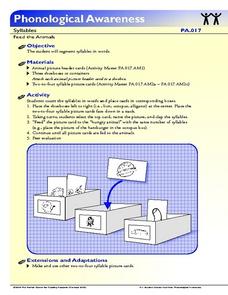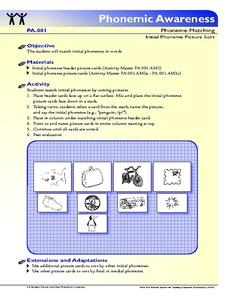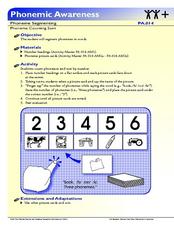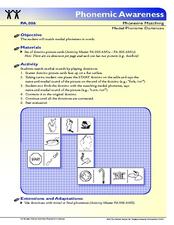Curated OER
Using Matrices to Enter Data and Perform Operations
Here's a TI step by step guided instructional activity on matrices. The class enters data into the TI calculator about movie ticket sales and uses matrices as a problem solving tool. They add and multiply matrices to determine profit.
Curated OER
Similarity and Dilations - Discover Properties of Similar Figures
Learners investigate properties of similar figures. In this properties of similar figures instructional activity, pupils construct similar figures using Cabri Jr. They dilate their figure to create a similar one, and discuss the...
Curated OER
Geometry: Translations and Reflections
Group work and participation is used to perform a specified translation or reflection. In this geometrical translation lesson, small groups of pupils are each given a shape to plot on a coordinate grid. Each shape is then translated or...
Texas Instruments
Complex Numbers: Plotting and Polar Form
Explore the concept of, and use the Ti-Nspire to, convert complex numbers into polar form. Then practice graphing complex numbers in the polar coordinate plane.
Curated OER
Forms of Quadratic Equations
Transformations of parabolas to fit a particular quadratic equation is taught through this lesson. In this transforming parabolas to fit a particular quadratic equation lesson, high schoolers describe the transformations of the parabola...
Curated OER
Graphical Analysis
Get out your TI-nspire graphing calculator and explore polynomials. Learners determine where a given polynomial are increasing or decreasing, find maximums, minimums, and zeros of polynomials, and discuss end behavior of polynomials....
Curated OER
Exploring Expressions
Examine parts of an expression in this algebra instructional activity. Ninth graders identify the properties of the coefficient and their behavior to the graph. They graph the equation on a TI to see their results.
Curated OER
Equivalent or Not Equivalent?
Algebra learners look at equivalent expressions in the context of three different operations: division, squaring, and absolute value. In comparing these values, they will identity when expressions are equivalent.
Curated OER
Linear Inequalities in Two Variables
Graph and solve linear equations in two variables. The class relates the concepts of linear equations to the real world.
Curated OER
Completing the Square
Solve equations by completing the square. The pupils factor quadratic equations and graph the parabola. They also identify the different terms in the equation and look for patterns.
Florida Center for Reading Research
Phonics: Letter- Sound Correspondence, Brown Bag It
Sorting objects according to their initial sound get scholars thinking about letter-sound correspondence. With 26 brown bags labeled with a letter of the alphabet, learners browse magazines and cut out images that begin with the...
Florida Center for Reading Research
Phonics: Letter-Sound Correspondence, Letter-Sound Pyramid
This fun game is a way to help your littlest learners build strong phonological awareness. Scholars equipped with letter triangles, a stack of picture cards, and counters choose a picture card, say the name of the image, and attempt to...
Florida Center for Reading Research
Phonics: Letter-Sound Correspondence, Letter-Sound Bingo
Young scholars build a strong understanding of medial sounds, vowels, and letter sound correspondence while playing Bingo. Taking turns, peers choose a card and say its name and medial sound; all players look for the vowel on their card....
Florida Center for Reading Research
Phonics: Letter-Sound Correspondence, Medial Phoneme Spin
A collaborative activity challenges young scholars to match medial graphemes and phonemes. Pairs take turns spinning the spinner, naming the letter, and saying its name. They choose from a stack of cards with the same medial sound.
Florida Center for Reading Research
Phonological Awareness: Syllables, Feed the Animals
An activity challenges scholars to sort picture cards based on the number of syllables they count as they say the item's name on each card. Depending on how many syllables they count, they place the card in the corresponding box...
Florida Center for Reading Research
Phonological Awareness: Syllables, Syllable Say
Counting syllables can be fun when it's done with a friend. In pairs, learners say words as their partner counts the syllables they hear.
Florida Center for Reading Research
Phonological Awareness: Phoneme Matching, Sound Train
Make a phonics train filled with matching initial phonemes. Early readers say the name of the objects on each of their cards, identify the initial letter sounds or phonemes, then paste them on a train. They make three trains, which means...
Florida Center for Reading Research
Phonological Awareness: Phoneme Matching, Pack-a-Backpack
Scholars sort words based on their initial phoneme or sound. Learners are given two backpacks, each with a picture card; they search and match picture cards with the same initial sound as the ones on each backpack.
Florida Center for Reading Research
Phonological Awareness: Phoneme Matching, Initial Phoneme Picture Sort
An activity focuses on phonemic awareness and initial letter sounds. Scholars sort picture cards by saying and matching the initial sounds each word makes.
Florida Center for Reading Research
Phonological Awareness: Phoneme Segmenting, Phoneme Closed Sort
Build phonological awareness with an activity that challenges learners to sort picture cards based on the number of phonemes each has.
Florida Center for Reading Research
Phonological Awareness: Phoneme Segmenting, The Sound Game
Pre-readers get a better understanding of phoneme segmenting and counting by playing a board game. They pick an image card from the stack, say the name of the object, break the word down into segments, then move their piece that number...
Florida Center for Reading Research
Phonemic Awareness: Phoneme Segmenting, Phoneme Counting Sort
Pre-readers use the provided cards to say and sort based on the number of phonemes in each word.
Florida Center for Reading Research
Phonological Awareness: Phoneme Matching, Medial Phoneme Dominoes
Matching medial phonemes can be as easy as playing a game of dominoes! These dominoes contain pictures of items children can say. As they say each word aloud, they work to match the medial sound to one on an adjacent card. Just like real...
Florida Center for Reading Research
Phonological Awareness: Phoneme Manipulating, What's Left?
Scholars subtract initial phonemes from given picture word cards to create new words. Feet becomes eat, and shelf becomes elf.

























